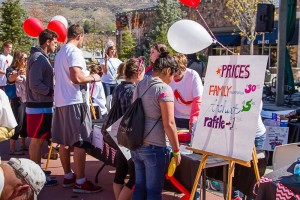
By Maddy Gray
The Orem Center for Women in Crisis answers the calls of women who have just been through the trauma of rape, and some BYU students serve by volunteering there.
Sariah Collard works at the Center for Women and Children in Crisis in Orem as the rape crisis team coordinator. She has a team of 40 volunteers, and together they answer the calls from police and hospitals immediately following rape reports in Utah County. They show up at the hospital — or wherever it may be — and help victims.
“Sexual relationships are so precious, which is why rape is so awful. It has nothing to do with sex and everything to do with power and control,” Collard said.
For Collard, this job is a long time coming. Her parents worked in the foster care system, sparking her early interest in social work. She worked as a hairdresser for a few years but ultimately ended up back where she started.
“You hear a lot of things being a hairdresser, mostly about people’s problems,” Collard said.
“Hair stylists have a way about them, or maybe it’s an inherent quality of the job. People open up, dumping their troubles at the salon chair,” she said.
“I loved doing hair, but I wanted to do more to help people’s problems,” Collard said.
She graduated from Utah State University May 2014 with a degree in social work and was hired at the Center for Women in Crisis in Orem in June.
“It was such a blessing to get this job when I did; plus, it’s exactly what I wanted to do,” Collard said.
As the rape crisis volunteer team coordinator, Collard teaches the 40-hour volunteer training mandated by the state, coordinates the 48-hour shifts between her team of volunteers, teaches weekly psychotherapy classes for victims of sexual abuse and promotes the free services of the center throughout Utah county.
She said she is passionate about the job and especially the issue of sexual abuse, something more prevalent in Utah than popular opinion would suggest.
“It can be daunting knowing that one in three women in Utah will suffer sexual abuse in their lifetime, but I think about the cops, therapists and victim advocates that are so passionate about what they do,” Collard said. “That’s what’s fulfilling, seeing my volunteers and all we’re able to do for the victims.”
A number of Collard’s volunteers are BYU students. Cameron Haas, a senior studying health science and Spanish, has volunteered on the rape crisis team for three years. He’s handled dozens of calls, the training being the basis of how he’s handled each.
“We’ll knock on the door and ask if it’s okay if we come in. Immediately, I can tell by the reaction if they want me there or not. There are plenty of things to do: talk to the family, talk to secondary victims, talk to the police and nursing staff, start the paperwork. Even if I can’t focus on the victim, I can focus on the situation,” Haas said.
The training time spent in class with Collard teaches team members the right tactics in how to go about handling the job, Haas said.
“It’s all about giving the victim power, because that’s what they lost. We’re there to give them choices — ’Is it okay if we come in? If you don’t want to do this, that’s okay.’ Giving back the victim power is key,” Haas said.
Meg Monk, a senior studying journalism, was trained by Collard and just started her volunteer shifts, an opportunity she’s already come to appreciate.
“Rape sucks, and it sucks that we have to have people do this job, but I’m glad that I’m able to do it because I would want someone there if it was me,” she said.
To become a volunteer or learn more about the programs offered by the Center for Women and Children In Crisis, contact Sariah Collard at .




